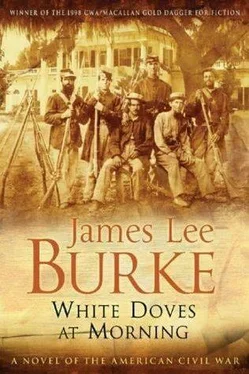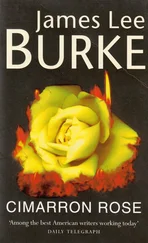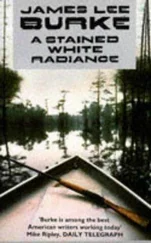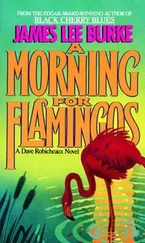Abigail stepped up on the plank walkway that led to Rufus Atkins' tent. The rain was slackening now, the sun breaking from behind a cloud, and the sky seemed filled with slivers of glass. She paused in front of the tent flap and cocked back the hammer on the revolver with both thumbs.
Then her hands began to shake and she lowered the pistol, her resolve draining from her like water through the bottom of a cloth sack. Why was she so weak? Why could she not do this one violent act in defense of a totally innocent creature whom the world had abused for a lifetime? In this moment, caught between the brilliance of the rain slanting across the sun and the grayness of the cane fields behind her, she finally knew who she was, not only a poseur but an empty vessel for whom stridence had always been a surrogate for courage.
She heard a rumbling sound on the road and turned and saw Willie Burke and Robert Perry crouched forward in a wagon, the boy named Tige clinging to the sides in back. Willie had doubled over the reins in his hands and was laying the leather across his horses' flanks.
So once more she would become the burden of others, to be consoled and protected and mollified, a well-intended, neurotic Yankee who was her own worst enemy.
But if she couldn't kill, at least she could put the fear of God in a rotten piece of human flotsam like Rufus Atkins.
She raised the pistol and threw back the tent flap and stepped inside just as a man emerged from a curtain and a tangle of mosquito netting in back, his posture stooped in order to get through the netting, a metal object in his right hand. His eyes lifted to hers, just before she pointed the revolver with both hands and squeezed the trigger and a dirty cloud of smoke erupted into his face.
Her ears rang from the pistol's report. Then she heard his weight collapse as he sank to one knee, a bright ruby in the center of his forehead, the muscle tone in his face melting, his arm fighting for purchase on top of a worktable, like an unpracticed elderly man whose belated attempt at genuflection had proved inadequate.
Outside the tent, she dropped the revolver from her hand and walked toward the stunned faces of Willie Burke, Robert Perry, and Tige McGuffy.
"I killed Ira Jamison by mistake. But I'm glad he's dead just the same. God forgive me," she said.
"You shot Ira Jamison?" Willie said.
"He had a wind chime in his hand. A silly little wind chime," she said.
She buried her face in Willie's chest. He could feel the muscles in her back heaving under the flats of his hands and could not tell if she was laughing or sobbing.
THE rain stopped and the air filled with a greenish-yellow cast that was like the tarnish on brass. The wind came up hard out of the south, flattening the cane in the fields, whipping the tent in which Ira Jamison died, riffling water in the irrigation ditches, scattering snow egrets that lifted like white rose petals above the canopy in the swamp. Out over the Gulf a tree of lightning pulsed without sound inside a giant stormhead.
As an old man Willie Burke would wonder what the eyes of God saw from above on that cool, windswept, salt-flecked August day of 1865. Did His eyes see the chime pried from Ira Jamison's dead hand and Robert Perry's revolver substituted for it?
Or did His eyes choose not to focus on an individual act but instead on the great panorama taking place below Him, one that involved all His children-leased convicts perched like carrion birds on a house frame in the middle of a wetlands, abolitionists and schoolteachers whose altruism was such they flayed themselves for their inability to change the world's nature, slavers whose ships groaned with sounds that would follow them to the grave, mothers and fathers and children who had no last names and would labor their lives away for the profit of others without ever receiving an explanation?
Did God's eyes see the past, present and future taking place simultaneously, perhaps on a mist-shrouded, alluvial landscape threaded by Indians and Spanish and French explorers and Jesuit missionaries, its hummocks surrounded with either saw grass or endless rows of cotton and cane, its earth pounded with the hooves of mounted jayhawkers and Confederate guerrillas or covered with flocks of birds and roving herds of wild animals, its mists flaring with either the spatter of musket fire and the red glow of burning crosses or lanterns lighting quiet residential streets and children at play in the yards?
Sometimes in the clarity of his sleep Willie Burke saw the same protean landscape he believed God saw, and a long column of soldiers wending their way toward the horizon, their butternut uniforms crusted with salt, their bullet-rent flags aflame in the sunset, a sergeant-major in a skull-tight kepi counting cadence, "Reep, reep, reep," while a brass band thundered out a joyful song like the one that had made Jim Stubbefield wonder if there wasn't something glorious about war after all. For reasons Willie did not understand, he wanted to join their ranks and disappear with them over the rim of the earth.
But in the mornings the dream escaped his grasp and his days were often filled with memories he shared with no one.
Then, five years after that late August afternoon when Abigail Dowling shot down Ira Jamison, Willie woke to an early frost, to the smell of wood smoke and the sound of trees stiff with ice and breakfast wagons creaking across stone. He walked out into the freshness of the dawn and, in a place inside his mind that had nothing to do with reason, he once again remembered his speculation about how the eyes of God viewed creation. He stood on the gallery in his nightshirt, the sunlight breaking on his bare feet, and imagined himself caught between the Alpha and the Omega, in the hush of God's breath upon the world, and for just a second believed he actually heard the words I am the beginning and the end. I am He who makes all things new.
In that moment he let go of his contention with both the quick and the dead and experienced an unbridled gladness of heart. He was a participant in the great adventure, on the right side of things, a celebrant at the big party, a role that until the day of his death no one would ever be able to deny him.
IN THE year 1868, one year after her release from the women's prison at Baton Rouge, Tige McGuffy, Flower Jamison, Robert Perry, and Willie Burke stood on the gallery of the school and watched Abigail Dowling become Mrs. Quintinius Earp.
Later the same year Lieutenant and Mrs. Earp would find themselves stationed on the Bozeman Trail, in southern Montana, in the middle of Chief Red Cloud's War. After the discovery of gold in the Black Hills, she testified before the U.S. Congress in hopes of gaining support for the protection of Indian lands, but to no avail. Until her husband's retirement from the army, she worked as a volunteer nurse and teacher among the Oglala Sioux and the Northern Cheyenne. Later, she moved with him to a small town outside Boston, where she became active in the Populist and early feminist movements of the 1890s. In 1905 she became a founding member of the Industrial Workers of the World, was the friend of Molly Brown and Elizabeth Flynn, and before her death in 1918 marched with the striking miners at Ludlow, Colorado.
Willie Burke became a teacher and later the superintendent of schools m New Iberia. For the remainder of his life he was known for his bravery as a soldier, his refusal to discuss the war, his prescience about human events and his irreverence toward all those who seek authority and power over others.
Flower Jamison married a black veteran of the Louisiana Corps d'Afrique and taught at the school she and Abigail Dowling founded until her seventy-ninth year. The school remained open well into the twentieth century and changed the lives of hundreds, if not thousands, of black children. Among the many distinguished educators who visited it were George Washington Carver and Booker T. Washington.
Читать дальше












